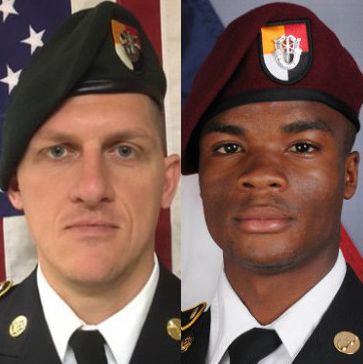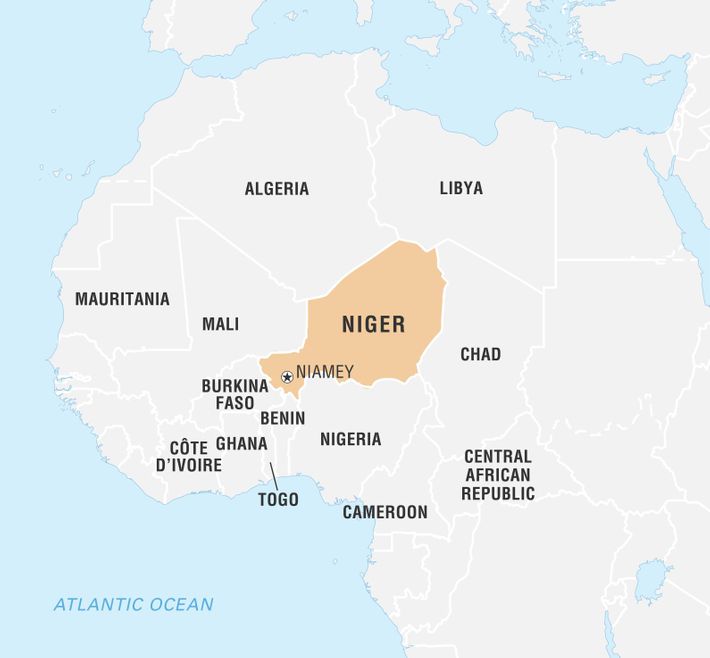
On Monday, President Trump was asked why he had yet to comment publicly on the deaths of four U.S. service members in Niger. Trump’s response set off one of the uglier incidents in an administration where controversy has become the norm. After Trump implied that his predecessors didn’t do enough to comfort grieving military families, a congresswoman claimed that the president told a young mother widowed by the Niger attack that her husband “knew what he signed up for.” Then the father of another deceased soldier said Trump promised to send him a $25,000 personal check weeks ago, but the money never arrived. (The White House says it’s now in the mail.)
The ongoing dispute over Trump’s treatment of Gold Star families runs the risk of overshadowing a more significant concern: More than two weeks after the attack, we don’t really know what happened in Niger.
Several lawmakers have called for a fuller explanation, and when asked on Thursday if the Trump administration is being up-front about the attack, which has been attributed to an ISIS-linked group, Senator John McCain said “no.” He added that as chairman of the Senate Armed Services Committee, he intends to get the information the panel “deserves and needs.” “Then you decide whether a quote investigation is needed or not,” he said.
Here’s a rundown of what we know, and the biggest questions about the attack.
Why U.S. Troops Are in Niger
Niger, along with neighbors Chad and Mali, is considered crucial to the war on terror. Local Al Qaeda and ISIS groups have established transit routes through the country that aid them in generating revenue and transporting fighters between north and sub-Saharan Africa.

The U.S. hasn’t disclosed much about its mission in Niger. In 2013, President Obama announced that 100 troops would be deployed to the country to “provide support for intelligence collection” and “facilitate intelligence sharing” with French forces and other allies in the region. Earlier that year, the French military intervened in Mali, after an Al Qaeda–linked group took over part of the country.
There are now about 800 U.S. troops in Niger, assisting in the fight against Al Qaeda, Boko Haram, and ISIS. Some of those troops operate a surveillance drone mission in the capital of Niamey, but according to ABC News, most are on construction crews working to set up a second drone base in the country’s northern desert. Less than 100 troops are aiding Niger’s military as part of Army Green Beret units.
The Attack
Twelve U.S. soldiers from the Army’s 3rd Special Forces Group were accompanying about 30 Nigerien troops on a mission near Tongo Tongo. After meeting with local leaders, they were ambushed by about 50 militants. A firefight ensued, and within roughly 30 minutes French military aircraft were on the scene, but the planes did not fire on the attackers. After the fight broke up, aircraft retrieved the remains of three U.S. soldiers: staff sergeants Bryan Black, Jeremiah Johnson, and Dustin Wright. Somehow Sergeant La David Johnson was separated from the rest of the group, and it took 48 hours to recover his body.
Aside from those rough points, there’s much confusion about the incident, starting with who was on the mission. As ABC News notes, according to one account, 12 soldiers from a Green Beret unit were accompanying 40 Nigerien soldiers to collect supplies and meet with village elders when they were ambushed. According to another version of events, only 8 to 12 American and Nigerien forces went into the village, and while a Nigerien platoon was nearby they were not involved in the firefight.
Some raised questions about the villagers intentions. Per CNN:
Some of the soldiers who attended the meeting with local leaders said that they suspected that the villagers were delaying their departure, stalling and keeping them waiting, actions that caused some of them to suspect that the villagers may have been complicit in the ambush, according to the defense official.
The Pentagon said similar operations had been carried out 29 times in the past six months and were considered routine. But concerns have been raised about why more precautions were not taken. The U.S. troops were armed with only rifles, and they arrived at the site in unarmored pickup trucks. CNN reports that the militants were wielding small arms, machine guns, and rocked-propelled grenades. One Pentagon official acknowledged that they were “well-equipped and trained.” It’s unclear whether any militants were wounded or killed in the fight.
There was no U.S. drone flying overhead to provide reconnaissance, and Reuters reported that French officials are frustrated because they feel the U.S. acted with limited intelligence and insufficient contingency planning.
U.S. defense officials said they believe the presence of French Mirage fighter-bombers helped break up the firefight, but different explanations have been offered for why they didn’t engage. Reuters suggested the fighting was at close quarters, so they couldn’t intervene, but multiple officials told CNN that Niger doesn’t allow air strikes on its territory.
NBC News reports that U.S. military officials have offered three different accounts of who flew the medevac helicopter: “First U.S. military officials said it was French military, then that it was the U.S. military. Now, they’re saying it could have been a U.S. contractor.”
Who Conducted the Attack?
Though there are multiple terror groups operating in the area, the Defense Intelligence Agency believes it’s “highly likely” that ISIS in the Greater Sahara was behind the attack, according to ABC News.
That group sprang up in 2015 when its leader split from an Al Qaeda group and pledged allegiance to ISIS. It hasn’t been formally recognized as a branch of ISIS and one U.S. official called it a “wannabe” — though that doesn’t mean the group is unsophisticated. The group has attacked French counterterrorism forces, but this would be its first strike on U.S. troops.
“We do have information on the group that did it, their nature, their disposition and so on and so forth and appropriate organizations within the United States Military are digging deeper into that and will take appropriate action if required,” Army Chief of Staff, General Mark Milley, told reporters on Monday.
Several officials told CNN that the Trump administration is talking with the Nigerien government about a possible U.S. military strike on the attackers.
The Investigation
Earlier this week, the Department of Defense announced that it will conduct an internal review of what went wrong during the mission, and now the Pentagon’s Africa Command (AFRICOM) has sent a team to Niger. “We need to collect some very basic raw facts,” one defense official told NBC News. The French military is investigating as well.
Pentagon officials said they’ve already “tightened up” operations in the region, and operations are on “pause” pending the review’s findings.
In addition to Senator McCain, Jack Reed, the ranking Democrat on the Senate Armed Services Committee, has called for a fuller explanation from the Trump administration.
“I think the administration has to be more clear about our role in Niger and our role in other areas in Africa and other parts of the globe,” Reed said. “They have to connect it to a strategy. They should do that. I think that the inattention to this issue is not acceptable.”
The Victims
SERGEANT LA DAVID JOHNSON
Johnson, 25, grew up in South Florida and was raised by relatives after his mother died when he was young. He met his future wife, Myeshia Manual, in elementary school. They have two children — a 6-year-old daughter and a 2-year-old son — and Myeshia is expecting their third baby.
Before entering the military, Johnson earned a social-media following as the “Wheelie King.” He removed the front wheel of his bike and was frequently spotted riding to his job at Walmart on just his back wheel. In 2013 he told a local TV station that he did it because he enjoyed the challenge.
He was remembered as a devoted father and husband, and Staff Sergeant Dennis Bohler, a friend and former supervisor, noted that he rose through the ranks quickly, from a private to a sergeant in under three years
“He caught on quickly. You tell him once, and it’s complete, any task,” Bohler told the Washington Post. “He was just that one soldier that always wanted to better himself every day. Every day, he wanted to do better than he did yesterday.”
STAFF SERGEANT BRYAN BLACK
Black, 35, was a Green Beret medic who always had a competitive streak. According to his obituary, in fourth grade he got annoyed when his brother won a trophy at a chess tournament and he didn’t, so he spent the entire summer learning chess and tied for second in the nation by sixth grade.
He displayed the same determination as an adult. “During his previous deployment to Niger he learned the local dialect Hausa because he wanted to be able to communicate directly with the people,” his obituary said. “He also spoke French and Arabic. Bryan was often in high demand within his team and with locals due to these efforts.”
He met his wife, Michelle Richmond Black, shortly after college, and they have two sons, Ezekiel and Isaac.
STAFF SERGEANT JEREMIAH JOHNSON
Johnson, 39, was a chemical, biological, radiological, and nuclear specialist, according to the Department of Defense. He was from Springboro, Ohio, and is survived by a wife and two daughters.
STAFF SERGEANT DUSTIN WRIGHT
Wright, who just turned 29, was from Lyons, Georgia. His brother, Will Wright, said he last spoke to him on his birthday, September 24.
“Talked about how things were going, the ups and downs. Talked about his girlfriend, talked about his plans when he came home, where he was going and some potential moves in his future,” Will Wright said.
Members of the Wright family have served in the military dating back to 1812. “To our records, we had not lost a single member until Dustin. That’s 205 years, that’s a good run. So, it’s been great to hear that history and share that history and if once every 205 years this is a price we pay, then that’s what it takes,” Will Wright said.






























